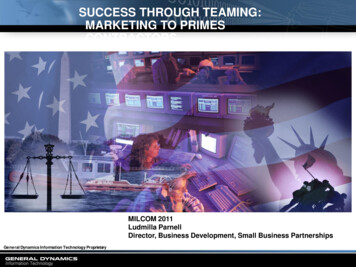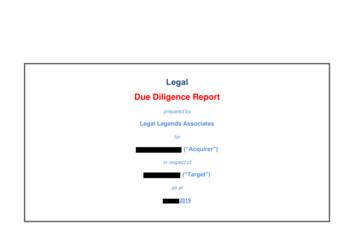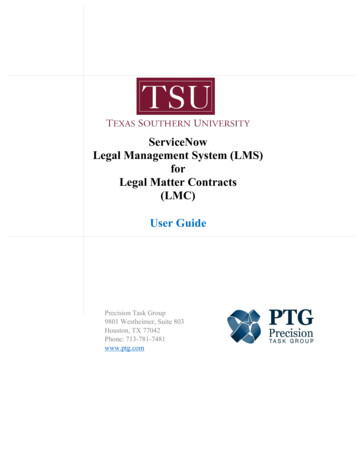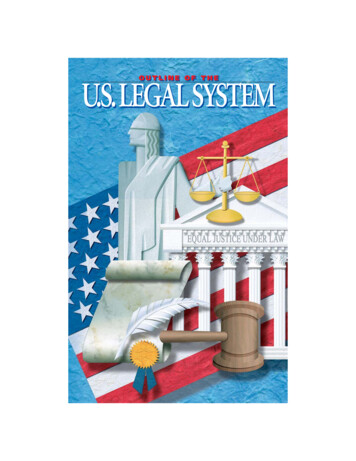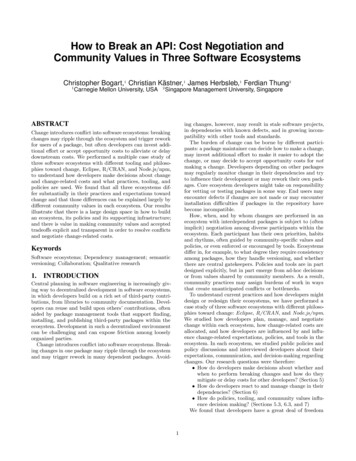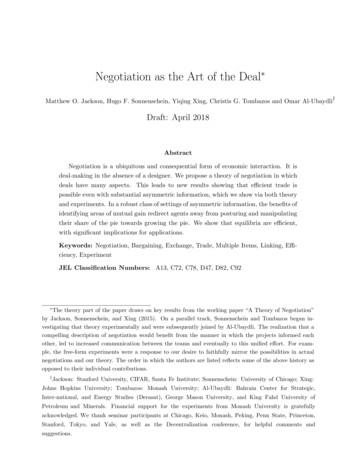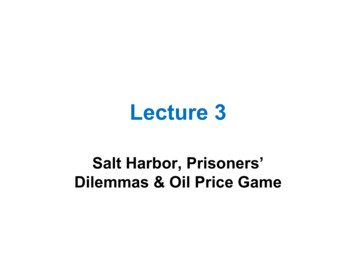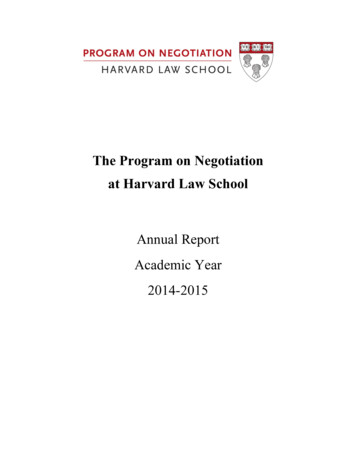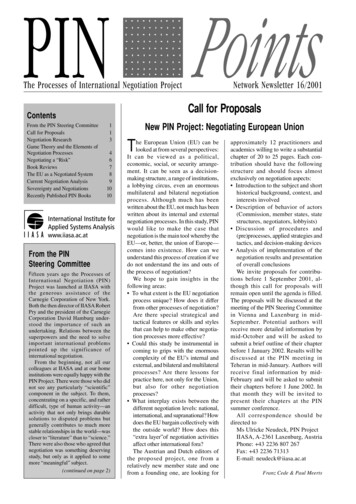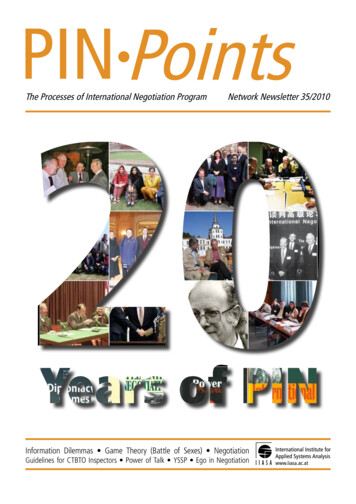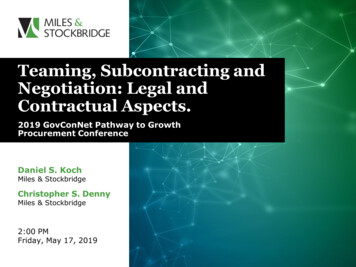
Transcription
Teaming, Subcontracting andNegotiation: Legal andContractual Aspects.2019 GovConNet Pathway to GrowthProcurement ConferenceDaniel S. KochMiles & StockbridgeChristopher S. DennyMiles & Stockbridge2:00 PMFriday, May 17, 2019
Firm OverviewMiles & Stockbridge is a leading law firm with 200 attorneys and offices in the mid-Atlantic region, includingMiles & Stockbridgeoffices across Maryland, in Washington, D.C. and inwww.milesstockbridge.comNorthern Virginia. Our lawyers help global, national, localTwitter: @mstockbridgelawand emerging business clients preserve and create valueby helping them solve their most challenging problems.
Disclaimer The opinions expressed and any legal positions asserted in this presentationare those of the authors and do not necessarily reflect the opinions orpositions of Miles & Stockbridge P.C. or its other lawyers.The opinions presented in this presentation do not constitute legal advice.Counseling in a particular procurement will depend upon assessment of allrelevant facts and documents. Consult counsel before relying upon generalstatements in this presentation.No part of this presentation may be reproduced or transmitted in any waywithout the written permission of the author. Images are subject tocopyright. All rights reserved.
Presenters
Daniel S. Koch practices government contracts law, cybersecurity, andtechnology licensing. For more than 25 years, Dan has advisedgovernment contractors, particularly professional services and informationtechnology firms, on the full range of government procurement issues,including both counseling and litigation.Typical counseling in this ever-changing and highly legalized environmentincludes structuring teaming agreements and subcontracts; preventing ornegotiating disputes between prime and subcontractors at all levels; smallbusiness, minority, service-disabled veterans’ and women-owned businessset-aside contracting; specialized Contractor Teaming Agreements for theFederal Supply (GSA) Schedules; organizational conflicts of interest;protecting intellectual property in government contracts; terminations andclaims; debarments and suspensions; and state and local procurements.On the Government contracts litigation side, he has brought and defendedinnumerable bid protests before the Government Accountability OfficeDaniel S. y the General Accounting Office, or GAO), the Court of FederalClaims, the Federal Aviation Administration’s Office of Dispute Resolutionfor Acquisition (ODRA), agency protests and size protests before the Small11 N. Washington St.Suite 700Rockville, MD 20850litigation before the boards of contract appeals, other administrativetribunals, arbitration panels and courts. When disputes betweencontractors arise, he counsels on or defends allegations of unfairBusiness Administration, qui tam (False Claims Act “whistleblower” cases),competition and antitrust violations.
Chris Denny, is a government contracts lawyer at Miles &Stockbridge. Chris assists his clients with a range ofgovernment contracting issues, including: small businessprogram compliance (SBA, DOT, state and local programs);Buy American Act and Trade Agreement Act compliance, laborcompliance (Davis-Bacon and Service Contract Act); andnegotiating subcontracts and teaming agreements. Chris alsohas experience handling bid protest litigation and managinggovernment contract claims and disputes.Christopher S. Denny301.517.4844cdenny@milesstockbridge.com11 N. Washington StreetSuite 700Rockville, MD 20850
Ryan Nuessle co-founded Bravium Consulting, Inc. in2010 and currently serves as the company’s ChiefOperating Officer. He has 15 years of practicalexperience in the field of management and technologyconsulting. Previously, he climbed the ranks within aglobal, top-tier consulting firm, where he had a successfuland rewarding career in delivering technology-basedsolutions within the Federal market.Ryan NuessleCOO, Bravium Consulting, Inc.Ryan has helped expand Bravium into a variety ofindustry verticals, such as Health Care, Defense, Civilian,State & Local, Financial, Legal and others. As a memberof the executive team, Ryan strives to hire the bestpeople and deliver exceptional customer service andsolutions to Bravium’s clients. As a result, the Braviumteam has generated high customer satisfaction scores,and received multiple performance awards, while itsexcellent reputation has attracted new clientele andemployees.
Steven FlowersCOO, Knowesis Inc.Steven Flowers is a Principal and the Chief OperatingOfficer of Knowesis Inc. He has 35 yearsof healthcare experience, including over 15 years ofmanagement consulting with large publicly-tradedcompanies with expertise in program management,continuous improvement, government contracting,systems thinking, analysis, data mining, knowledgemanagement, decision support, and informationtechnology. During this career, Mr. Flowers has managed 350M Federal contracts. Mr. Flowers served as aMalcolm Baldrige National Quality Award Examiner as wellas an Air Force Quality Examiner. He had a distinguishedmilitary career as an Air Force Medical Service Corpsofficer with service in command positions and the Office ofthe Air Force Surgeon General. He was a key contributorto a military health project selected for Vice-PresidentGore's Golden Hammer Award. He also holds a MasterCertificate in Government Contract Management, SixSigma Black Belt, and Lean Six Sigma from VillanovaUniversity. Mr. Flowers has Bachelor of Science in PublicHealth Administration from the University of NorthCarolina at Chapel Hill, a Master of Science in Systemsand Management Air Force Institute of Technology and aMaster of Science in Law from Champlain College.
Teaming Agreements For today’s discussion, only agreementsto form a prime contractor/ subcontractorrelationship, to pursue identifiedcontracting opportunities. Excluded from today’s discussion:oJoint venturesoMentor-protégé agreementsoGSA Schedule Contractor TeamArrangement (CTA)
Is a teaming agreementenforceable? –Pre-award commitments Enforceability of the agreement is thefundamental issue surrounding TAs. Typical preaward commitments:oExclusive participation (sole proposal) towin award for this procurement.oNondisclosure of confidential information.oAny other obligations through submittingproposal. Should be enforceable. But rarely controversial.
Is a teaming agreementenforceable? –Post-award subcontract Enforceability of the subcontract award, after theproposal wins the prime contract, is thefundamental issue surrounding teamingagreements. Teaming Agreements often state that the partieswill negotiate the details of the subcontract,typically after award of the prime contract. Maryland and Virginia have held that such nonspecific teaming agreements are unenforceable,because they are merely “agreements to agree.”Advance Telecom Process, LLC v. DSFederal, Inc.,119 A.3d 175, 224 Md.App. 164 (2015); CyberlockConsulting, Inc. v. Information Experts, Inc., 939F. Supp. 2d 572 (E.D. Va. 2013), aff'd, 549 F.App'x 211 (4th Cir. 2014).
Teaming Agreements –Post-award subcontract (cont’d)How can a subcontractor create anenforceable right to a subcontract? These approaches can’t guarantee success,but offer the best chance.BE SPECIFIC! Don’t end up with anagreement to agree.Specify that a subcontract WILL BEAWARDED if the prime contractor wins thetargeted opportunity.Specify workshare, by type of work, orpercentage. Specify whether calculatedannually, for overall contract, or per taskorder (if applicable).Specify subcontract pricing. If billing ratescannot be stated in the TA, there must bea mechanism to determine the subcontractprice.
Teaming Agreements –Post-award subcontract (cont’d)How can a subcontractor create anenforceable right to a subcontract? Scrutinize termination clauses. Do notagree that the TA will terminate ifsubcontract not negotiated in a certainamount of time (30-90 days typically).To the extent possible, eliminate alllanguage that conditions the subcontracton the occurrence of other events.Consider attaching the subcontract formthat will be used if the prime contractorwins the targeted opportunity.Consult with counsel or experiencedcontracts professionals. Consideralternatives to teaming agreements.
Teaming Agreements –Pre-Negotiation Questions Do I need an enforceable Teaming Agreement?oIf the proposal effort is light, the Team Leader is a trusted entity, and the work is notessential to your business, a standard unenforceable TA may be fine. Do I have the bargaining power to obtain an enforceable Teaming Agreement?o If the Team Leader can win the work without you, you likely do not.Why negotiate an unenforceable agreement?oPre-award commitments would be enforceable.oMany contractors actually do what they agree to do. So it’s always worth trying tonegotiate the best price and workshare terms that you can.oWhen subcontracting from a large business, require it to name you in the proposal andspecify the work you will perform in the proposal. If it has a small business subcontractingplan, it may trigger the protections (albeit limited) of the Small Business Jobs Act. See 13CFR § 125.3(c)(3), (4).oTest the value of the relationship. If the Team Leader refuses to even name you in theproposal, then this effort may not have value, and you can commit resources elsewhere.
Teaming Agreements –Key Subcontract Clauses? Subcontractor can use TA to specify key clauses that must be included in thesubcontract.oPayment 45 days after submitting invoice to prime contractor; or ifpayment after prime receives payment from Government, then paysubcontractor in shortest time possible after receipt (i.e., 5 businessdays?).oTermination for convenience: prime can terminate subcontract, only ifGovernment terminates sub’s work -- NOT just for prime’s convenience.oFor task-order contracts, sub may want right to see every request for taskorder proposal issued by Government, and may want right to submitproposal, i.e., “drag-along” prime to bid on task order.oConsider any other clause in subcontract potentially important tosubcontractor – TA may be best opportunity to ensure its inclusion.
Subcontracts – Overview Statement of Work & Pricing Changes & Termination Clauses Inspection and Acceptance Payment Liability Dispute Resolution
It’s All About Risk Management nt/
Prime Contract Flow –Downs Always review the prime contract.Be aware of general flow-downsincorporating the entire primecontract into your subcontract.Review specific provisions beingflowed down from the prime contractinto your contract. For commercial items, FAR requiresfew, if any, prime contract clausesto be flowed down tosubcontractors.
Statement of WorkDo you have one? How can youassess risk without a SOW?Items to Consider in the SOW: Workshare – How is itdetermined? Key Personnel – Replacementissues? Benchmarks and Deadlines Deliverables Specifications –Quantity and Quality Acceleration and Delay
Changes &Termination ClausesChange Clauses Flowdown from govt vs. prime’s unilateralchanges (to drawings, specs, designs,delivery, method of shipment, quantity) Notice deadlinesTermination ClausesDefault (or “Cause”)Convenience specific; None; cure period; Govt only; reasonable costsaccrued; Mutual dispute provision; limitation of liabilityoNotice period –as long aspossible
Inspection, Acceptance and WarrantiesStep 1 – Know the Prime Contract Review the RFP – Sections E, H and I of the RFP have the contract termsthat will apply to the prime contract. Review the prime contract inspectionand acceptance clause (referenced in section E), and any warranty clauses(Section I or FAR 52.212-4 for commercial item contracts). Now you knowwhat obligations the Prime has to the Government, and you are prepared tonegotiate.Step 2 – Negotiate Many subcontractors simply do not push back on the subcontractspresented to them by their prime contractors. Watch out for T&M or labor hour subcontracts that try to “back door” firmfixed price concepts (such as no cost re-performance) through theinspection and acceptance, and warranty clauses. This is “the best of bothworlds” for the prime and “the worst of both worlds” for the subcontractor.
Payment – Contract Types Is payment owed within a set amount oftime (30 days from submission of aproper invoice?) or is it contingent uponother events? Understand the difference between“pay-when-paid” and “pay-if-paid.” Review any clause that allows for set-offor non-payment.
Liability (1 of 2)Indemnification ProvisionsAvoid –oOverly broad indemnification provisions(e.g. “indemnification arising out of theperformance of the subcontract”)oProviding indemnification for claimsarising out of the conduct of others (e.g.“whether arising in whole or in part”)oIntellectual property indemnification whenyou are not providing design workLiquidated DamagesoPayments in lieu of actual damagesoWhat is the daily damages rate?oHow is it calculated?oExclude –force majeure, excusable delay or actioninitiated by 3rd party
Liability (2 of 2)Limitation of Liability Seek to waive indirect, consequential,special, incidental damages. Be carefulabout disclaiming “lost profits” damages,which can be direct as well asconsequential. Both sides may want rightto recover “lost profits” that qualify asdirect damages. Cap overall liability at contract price orreasonable fixed amount.
Dispute Resolution Always consider:o Choice of lawo Jurisdictiono Venue Escalation –good faith resolutionbetween principals, nonbinding mediation,arbitration or courtPrevailing party attorneys’fees ?
Questions
ConclusionDaniel S. her S. Denny301.517.4844cdenny@milesstockbridge.com11 N. Washington StreetSuite 700Rockville, MD 20850
ConclusionSteve Flowers703.906.4099sflowers@knowesis-inc.comRyan Nuessle520.440.4078rnuessle@braviumconsulting.com
Certificate in Government Contract Management, Six Sigma Black Belt, and Lean Six Sigma from Villanova University. Mr. Flowers has Bachelor of Science in Public Health Administration from the University of North Carolina at Chapel Hill, a Master of Science in Systems and Ma
